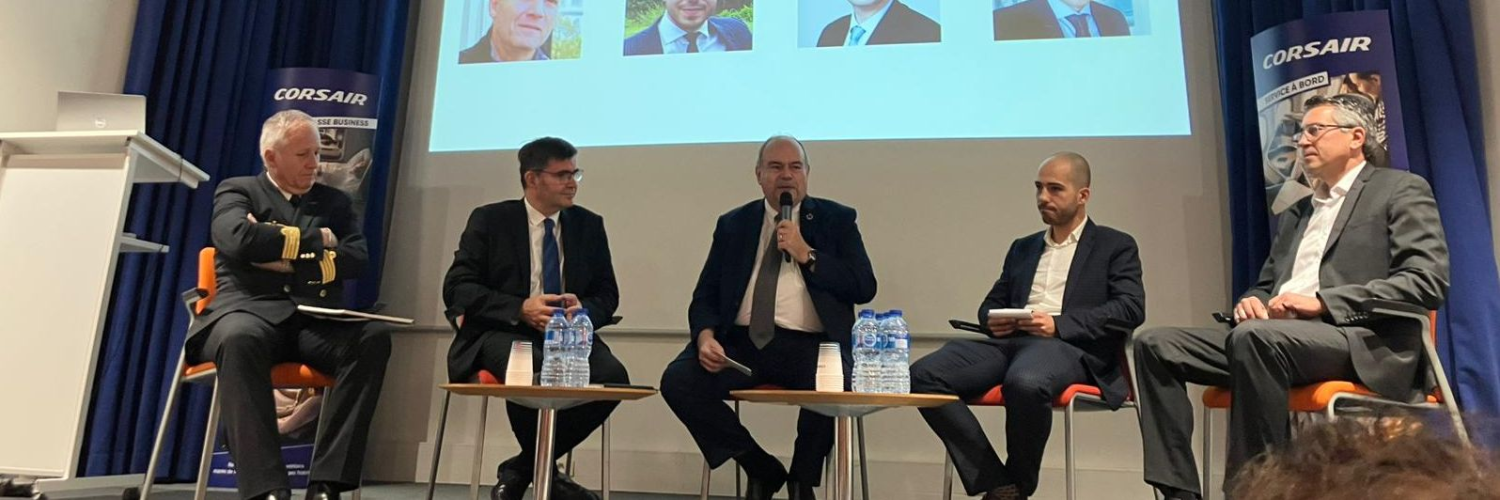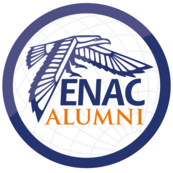News

Launch of the ENAC Alumni CORSAIR group
In collaboration with Corsair and as part of the development of their CSR policy, two round tables dedicated to innovations that reduce the environmental impact of the airline industry were organized on TUESDAY OCTOBER 1 from 1:45pm to 5:00pm at Orly 4. This was an opportunity for the association to launch the ENAC Alumni CORSAIR group!
Introductory remarks by Pascal de IZAGUIRRE - CEO of Corsair
Corsair regularly collaborates with ENAC, often recruiting its graduates for managerial and executive positions. Decarbonization is a crucial issue for aviation, a sector that is often criticized, yet at the forefront on this subject. Corsair stands out for its exemplary approach: fleet renewal, 8th Airbus NEO expected in October, and eco-pilot measures to limit emissions. Collaboration between airlines, airports and equipment manufacturers is essential to achieve these objectives, supported by massive investment in technologies such as sustainable fuels (SAF), whose cost is 4 to 8 times higher than traditional fuels.
A word from Marc HOUALLA (IENAC 82 and IAC 89) - President of ENAC Alumni
Marc Houalla expressed his enthusiasm for the launch of the Corsair network and the role of ENAC Alumni in the Sustainable Aviation Observatory project. He is convinced that engineers will rise to the challenge of decarbonization, while strengthening professional ties and the sense of belonging to ENAC. ENAC Alumni strives to share the results of the think tanks, notably with concrete examples such as ADP. He also stressed the importance of these exchanges in advancing the transition of the airline industry.
First round table: " Innovation for environmental efficiency ".
Round table participants :
- Félix Marie: Head of Operations Engineering at Corsair
- Tim Batten: Director of Operations and Flight Captain at Corsair
- Nicolas Jeuland: Environment and fuel expert at Safran
- Michael Benhamed (IENAC 94): ENAC representative, Head of Airworthiness Division
Moderator: Philippe Fonta: Graduated from ENAC in 1990, former Airbus executive, CSR consultant.
- Philippe Fonta: Technological progress, while necessary, is not enough. Low-carbon fuels are still expensive and scarce, requiring greater efficiency from aircraft fleets, thanks in particular to innovations such as the Open Fan (turbine outside the nacelle).
- Félix Marie: Optimizing flight procedures is crucial. Measures such as continuous descent or single-engine taxiing offer substantial fuel savings. For example, these route optimizations can save the equivalent of a round trip to Martinique in one year.
- Tim Batten: Optimizing aircraft weight on departure, notably with better real weight management (ZFW), and reducing fuel reserves can also reduce consumption.
- Michael Benhamed: The use of data is an important lever. However, we need to avoid over-collection, so as not to add to the environmental burden of digital infrastructures.
- Nicolas Jeuland : It's essential to take into account non-CO2 effects, such as contrails, which can have a significant environmental impact.
All the speakers stressed the importance of collaboration in meeting these challenges. Sharing experience between airlines, equipment manufacturers and academics is a key to success.
Second round table: " What are the levers for reducing environmental impact in the airline industry?
Round table participants :
- Damien Gaudin (MS MTA 19): Former Coordinator of the Sustainable Aviation Observatory
- Blandine Landfried (IENAC 06): Head of Environment and Energy Department at ADP
- Enea Fracassi : Director of Operations and Fleet at Corsair
- Cyrille Digon (IENAC 92): Director of Operational Support and CSR at Corsair
Moderator Félix Marie: Head of Operations Design Office at Corsair
- Damien Gaudin : SAF is currently the most mature technology, far more so than hydrogen or electric power. However, their development requires a real industry in Europe, similar to what has been done in the United States with the Commercial Aviation Alternative Fuels Initiative (CAAFI) since 2006.
- Blandine Landfried : Airports have a dual role to play: supporting airlines in the transition to SAF, while investing in production. Incentive measures already exist, notably in Sweden and at Amsterdam airport, where companies obtain cost reductions when they use SAF.
- Enea Fracassi : The renewal of Corsair's fleet has led to a 15% reduction in fuel consumption compared with Airbus 332s, and a 25% reduction compared with the old 747s. However, incentives are still lacking at sector level to encourage this transition.
- Cyrille Digon : The effects of non-CO2 emissions, such as NOx and contrails, are not yet fully understood. However, it is crucial to make progress on these issues, notably in collaborative projects such as SESAR, but also around projects such as "Alliance Environnementale Paris-Orly", which brings together 43 partners around Orly airport to take concrete action on decarbonization.
Conclusion
These roundtables highlighted the complexity and multiple levers required to decarbonize aviation. Technologies are making headway, but they need to be accompanied by active collaboration between all players in the sector, be they manufacturers, academics or operators. There's still a long way to go, but the initiatives underway demonstrate a real desire for change.















No comment
Log in to post comment. Log in.